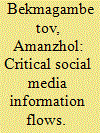| Srl | Item |
| 1 |
ID:
161353


|
|
|
|
|
| Summary/Abstract |
In political regimes where traditional mass media are under state control, social networking sites may be the only place where citizens are exposed to and exchange dissident information. Despite all the attempts, complete control of social media seems to be implausible. We argue that the critical information that people see, read and share online undermines their trust in political institutions. This diminishing trust may threaten the legitimacy of the ruling regime and stimulate protest behaviour. We rely on original survey data of Kazakhstani college students to confirm these expectations. The data are unique in that they directly measure exposure to critical/dissident information, as opposed to simply assuming it. The analysis leverages Coarsened Exact Matching to simulate experimental conditions. This allows us to better identify the consequential mechanism and the attitudinal precursor by which social media influence protest in an authoritarian context.
|
|
|
|
|
|
|
|
|
|
|
|
|
|
|
|
| 2 |
ID:
192867


|
|
|
|
|
| Summary/Abstract |
A wealth of research examines the relationship between digital media consumption and political participation. Research typically defines participation broadly and focuses on Western contexts. We seek to add to the understanding of this relationship by focusing more directly on the relationship between digital media consumption and the propensity to vote among young people in a less democratic context. To do so, we examine a set of Central Asian countries (Kazakhstan, Kyrgyzstan, Tajikistan and Uzbekistan) that have varying degrees of democratization. We test whether digital media consumption stimulates voting among respondents aged 18–30, and if this is contingent on how free and fair are the elections. Our results suggest that in the most democratic country, Kyrgyzstan, the relationship between digital media use and the propensity to vote is relatively flat while digital media use in less democratic countries, overall, is associated with a decrease in the propensity to vote.
|
|
|
|
|
|
|
|
|
|
|
|
|
|
|
|